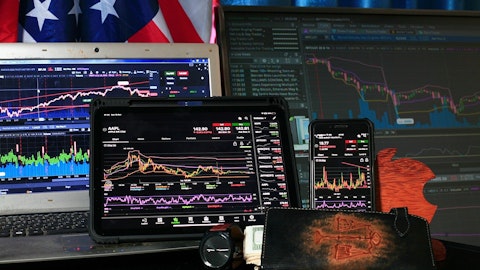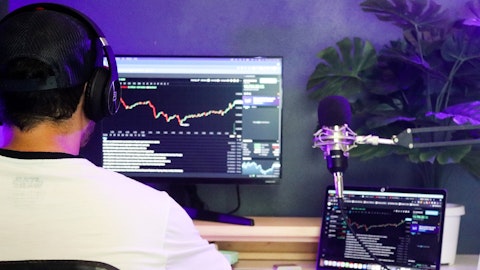Terrence Duffy: So Craig, again, I’ve been also talking a lot about market structure and how market structures always have a shelf life, and we don’t know what the next one is going to look like, but we all need to be prepared for, and that’s what CME will always do. We’ll be prepared for anything that comes our way. That’s one of the reasons we filed for the FCM application, not just because of FTX. But not to say you’re wrong because that was part of the reasons why, but it was again around market structure. I think with these vertically integrated models that is being proposed such as MIAX and I think Coinbase is the other one you referenced, the conflict of interest question for the clients is huge. And it would be big for us, too, if we decided to go ahead and deploy an FCM.
So we would have to be very careful about that ourselves. But the same breath, I think that if they’re going to go down this integrated model, they need to write rules associated with. This was my entire complaint around FTX that they were trying to make existing rules fit for their business proposal. So if, in fact, we’re going to have integrated models of what MIAX is proposing today and go into business in the United States, you need to write rules with them because the Commodity Exchange Act clearly states in the year 2000 that those rules were written with intermediaries in mind, not on a direct model. So no saying you couldn’t have intermediaries in the direct model, but the rules are not clear on that. So I think there’s a long way to go.
I think one of the reasons they’re not getting much attention today on that is because of their size, which I think is wrong to look at it that way. It shouldn’t matter their size. Who’s to say they can’t get bigger tomorrow, who’s to say we can’t do something different tomorrow as well. So I think there needs to always be rules and the rules of the road need to be applied so people understand that we do not need situations like 2008 and other ones that we could all describe because of people trying to advance businesses that they think is in their best interest without having the public’s interest at heart. So again, we’ve always been a neutral facilitator of risk management. We will continue to do so. We like the intermediary model and again, but we don’t know what the future is going to hold.
But I do — I am very concerned about some of these existing platforms. And the government needs to look at them and write rules for them if, in fact, they’re going to allow them to stay in business.
Craig Siegenthaler: Thank you, Terry.
Terrence Duffy: Thank you.
Operator: Thank you. Our next question is from the line of Andrew Bond with Rosenblatt Securities. Please go ahead. Your line is open.
Andrew Bond: Thanks. Hi. Good morning One for Derek on the energy business. So energy markets, particularly natural gas markets, have experienced some structural shifts benefiting North American markets following the Russian invasion of Ukraine. More recently with the geopolitical events in the Middle East, are you seeing more of a continuation of these dynamics? And can you talk about the potential longer term impact of the geopolitical events of late on your markets?
Terrence Duffy: Andrew, thank you. We appreciate it. And Derek?
Derek Sammann: Yes. Thanks, Andrew. Yes, I think this is kind of proof positive of what we’ve been talking about for the last couple of years that structurally, the U.S. is an incredibly strong position, given the position we have, both in crude oil as well as natural gas. As you know, we’re currently exporting record amounts of oil from the U.S. at 4.6 million barrels a day. We’re also exporting record levels of natural gas while based on Henry Hub pricing record levels from our U.S. capacity point of view. So as we’ve talked about, that structurally positions CME’s WTI franchise as kind of the leader in that space and certainly positions WTI as a global benchmark as the U.S. continues to export the marginal barrel outside the U.S. with challenges everywhere else.
Natural gas, as you pointed out, has been a really, really strong point for the energy franchise overall. When you look at what’s going on from an uncertainty point of view, options continue to be a significant proportion of our customers’ client behavior. So we like our position in both natural gas and crude oil, when you look at the volume and growth of the both futures and options, strong in Q3. More importantly, we continue to see that strength in October with our energy options up 81% overall, energy up 26% in October. So really strong year this year, continuing really strong year into Q4. And the position that we have as the swing producer, both in natural gas and crude oil, I think, positions us well long term in what we think is a potentially multigenerational energy shift.
Andrew Bond: Thank you.
Terrence Duffy: Thanks, Andrew.
Operator: Thank you. Our next question is a follow-up from Alex Kramm with UBS. Please go ahead. Your line is open.
Alex Kramm: Yes. Hello, again. Just a quick one on the interest rate business again. You guys, Terry mentioned the LIBOR, SOFR transition. Obviously, that’s now behind us and successful. But just maybe looking back on that, I think early on, there were some concerns that SOFR would not be the best replacement for Eurodollar and that maybe it won’t meet certain trading strategies. So now that we’re sitting here, I don’t know, six months after the real cutoff, is the marketplace different at all? Are you seeing certain strategies not being applied anymore? And is that still room for innovation for you or SOFR, Eurodollar basically now the same thing as it always was? Thank you.
Terrence Duffy: So I’m going to let Tim answer as well, Alex. But I will say the following that the reason why people believe that SOFR might not be as good as your Eurodollar is because of pure uncertainty. When you know a certain way for so many decades of how you’re going to price short-term interest rates and all of a sudden, the governments say you have to change them, it’s the uncertainty of the marketplace for starters. As far as it goes to the strategies, I think Tim already outlined the open interest in trade and SOFR. So you would have to say the answer to question number two, are people not doing certain strategies is no. So question number three is are — is there opportunity for people, I think was the last thing you had asked for the SOFR versus what was not in the LIBOR, and I’ll turn that to Tim.
Tim McCourt: Yes. Thanks, Terry, and thanks, Alex, for the question. I think what’s interesting is when we see several months after the transition, we look at the SOFR complex at CME year-to-date through Q3, I believe we’re already about 14% above the best year in Eurodollar previously. And we still have a whole quarter to go, which is exciting. So certainly adopted, certainly being integrated. We’re seeing similar strategies with respect to the various option strategies, the futures, the outrights, the spread. So we’re really pleased with how the ecosystem is coming along. But the one thing I would add is we also have new additional short-term interest rate products that can be spread against SOFR. When we look at the introductions of T-bills, and as Terry said in his opening comments with respect to us leading and taking really strong roots in the ESTR market overseas, these are all new things that are additive to the ecosystem that didn’t exist when Eurodollars are around.


